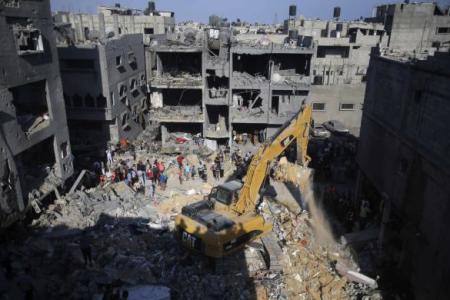Israel Air Strike Kills Three Top Hamas Commanders Following Ceasefire Collapse

An Israeli air strike in the Gaza Strip on Thursday has killed three top Hamas commanders that it had identified as having "planned deadly attacks against Israeli civilians." Israel and the Palestinian militant group have resumed fighting following the collapse of a 10-day ceasefire.
The three senior Hamas military figures who were among six killed were identified as Mohammed Abu Shammala, Raed al-Attar and Mohammed Barhoum, with Hamas stating that they died in the bombing of a house in the southern town of Rafah.
Hamas has vowed revenge against the air strike, with spokesman Sami Abu Zuhri telling Reuters:
"The assassinations of the three Qassam leaders is a grave crime. But it will not break our people and Israel will pay the price for it."
Israeli Prime Minister Benjamin Netanyahu has praised the "outstanding intelligence" that led to the successful operation and said that the Hamas leaders "planned deadly attacks against Israeli civilians." The Israeli military and Shin Bet, the internal security service, confirmed that the death of two of the leaders today were the most senior Hamas leaders killed by Israel since the Gaza conflict began on July 8.
The 10-day truce in Gaza collapsed on Tuesday after Hamas fired rockets at Israel, which retaliated by launching air strikes at terrorist targets.
The renewal of hostile activities put on hold long-term peace talks in Cairo, with Israel recalling its negotiators, noting that the rockets fired from Gaza "made continuation of talks impossible."
Over 2,000 people, mostly civilians, have been killed in Gaza since the violent conflict began. While Hamas has blamed Israeli aggression for the death toll, Netanyahu has said that militants are using people as "human shields" and are hiding out in residential areas from where they launch their attacks.
BBC News said that Hamas military chief Mohammed Deif had survived another Israeli strike a day earlier that reportedly killed his wife and child.
The strike on Rafah on Thursday reportedly demolished a four-storey building, with dozens of people still missing, according to Palestinian health official Ashraf al-Kidra.
The three commanders that were killed played key roles in operations including smuggling, tunnel construction and the capturing of Israeli soldier Gilad Shalit in 2006.
Israel's military has carried out some 20 strikes in Gaza overnight in response to militant rocket attacks, noting that as many as 213 rockets have been fired at Israel since the ceasefire collapsed.
Egypt has expressed its "profound regret" at the collapse of the 10-day truce, but said that it would continue trying to broker a long-term deal.
The UN Security Council has also voiced its "grave concern" at the resumption of violence in Gaza and called both parties to "resume negotiations to urgently reach a sustainable and lasting ceasefire."
Netanyahu has meanwhile said that fighting could go on for a long while, until Israel completes its mission of eliminating terrorist threats.
"This will be a continuous campaign," the Israeli Prime Minister told reporters.
Israel said that it has destroyed over 30 terror tunnels in Gaza that had been used by militants to carry out attacks on Israeli people, and added that no tunnel-based attacks have taken place in the past 10 days.





















